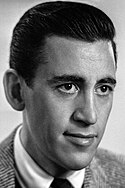J.D. Salinger Quote
I do like him. I'm sick of just liking people. I wish to God I could meet somebody I could respect........ Listen, don't hate me because I can't remember some person immediately. Especially when they look like everybody else, and talk and dress and act like everybody else. Franny made her voice stop. It sounded to her caviling and bitchy, and she felt a wave of self-hatred that, quite literally, made her forehead begin to perspire again. But her voice picked up again, in spite of herself. I don't mean there's anything horrible about him or anything like that. It's just that for four solid years I've kept seeing Wally Campbells wherever I go. I know when they're going to be charming, I know when they're going to start telling you some really nasty gossip about some girl that lives in your dorm, I know when they're going to ask me what I did over the summer, I know when they're going to pull up a chair and straddle it backward and start bragging in a terribly, terribly quiet voice--or name-dropping in a terribly quiet, casual voice. There's an unwritten law that people in a certain social or financial bracket can name-drop as much as they like just as long as they say something terribly disparaging about the person as soon as they've dropped his name—that he's a bastard or a nymphomaniac or takes dope all the time, or something horrible. She broke off again. She was quiet for a moment, turning the ashtray in her fingers.Franny quickly tipped her cigarette ash, then brought the ashtray an inch closer to her side of the table. I'm sorry. I'm awful, she said. I've just felt so destructive all week. It's awful, I'm horrible.
I do like him. I'm sick of just liking people. I wish to God I could meet somebody I could respect........ Listen, don't hate me because I can't remember some person immediately. Especially when they look like everybody else, and talk and dress and act like everybody else. Franny made her voice stop. It sounded to her caviling and bitchy, and she felt a wave of self-hatred that, quite literally, made her forehead begin to perspire again. But her voice picked up again, in spite of herself. I don't mean there's anything horrible about him or anything like that. It's just that for four solid years I've kept seeing Wally Campbells wherever I go. I know when they're going to be charming, I know when they're going to start telling you some really nasty gossip about some girl that lives in your dorm, I know when they're going to ask me what I did over the summer, I know when they're going to pull up a chair and straddle it backward and start bragging in a terribly, terribly quiet voice--or name-dropping in a terribly quiet, casual voice. There's an unwritten law that people in a certain social or financial bracket can name-drop as much as they like just as long as they say something terribly disparaging about the person as soon as they've dropped his name—that he's a bastard or a nymphomaniac or takes dope all the time, or something horrible. She broke off again. She was quiet for a moment, turning the ashtray in her fingers.Franny quickly tipped her cigarette ash, then brought the ashtray an inch closer to her side of the table. I'm sorry. I'm awful, she said. I've just felt so destructive all week. It's awful, I'm horrible.
Related Quotes
She was a gypsy, as soon as you unravelled the many layers to her wild spirit she was on her next quest to discover her magic. She was relentless like that, the woman didn't need no body but an open r...
About J.D. Salinger
The Catcher in the Rye (1951) was an immediate popular success; Salinger's depiction of adolescent alienation and loss of innocence was influential, especially among adolescent readers. The novel was widely read and controversial, and its success led to public attention and scrutiny. Salinger became reclusive, publishing less frequently. He followed Catcher with a short story collection, Nine Stories (1953); Franny and Zooey (1961), a volume containing a novella and a short story; and a volume containing two novellas, Raise High the Roof Beam, Carpenters and Seymour: An Introduction (1963). Salinger's last published work, the novella Hapworth 16, 1924, appeared in The New Yorker on June 19, 1965.
Afterward, Salinger struggled with unwanted attention, including a legal battle in the 1980s with biographer Ian Hamilton and the release in the late 1990s of memoirs written by two people close to him: Joyce Maynard, an ex-lover; and his daughter, Margaret Salinger.
